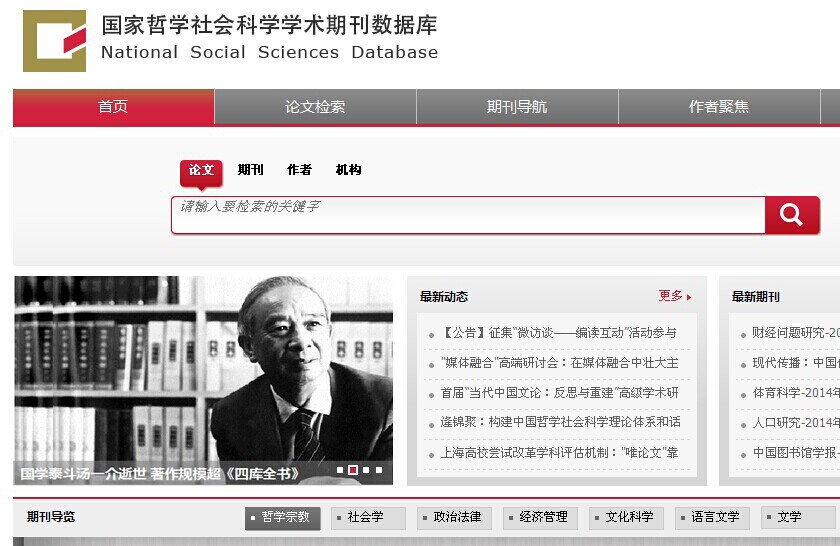Information technology driving change in research

July 16, 2013, the National Social Sciences Database officially launched by CASS.
Information technology has re-shaped human society in term of politics, economy, culture, society, military and technology, and it has also led to fundamental changes in research methods. In light of these trends, researchers are asking what e-science is, and how the study of philosophy and social science can benefit from advancements in IT.
The 10th Cross-Strait Symposium on IT and Application Exchange was held in Beijing on Sept. 2. At the symposium, an in-depth discussion was conducted among scholars from the Chinese Academy of Social Sciences (CASS), the Chinese Academy of Sciences (CAS) and Taiwan Academia Sinica on the development strategy of e-science, information infrastructure, and the application of IT in social sciences studies as well as ways to meet the new demands, new trends and challenges in the e-science era.
The term “e-science” is generally used to describe the application of IT in scientific investigations in Western countries, which consider resource-sharing networks and cross-origin collaboration to be the key to e-science development. The concept “e-social science” was brought up later. Wang Guocheng, a research fellow at the Institute of Quantitative and Technical Economics at CASS, said science encompasses natural science as well as the humanities abroad, so social sciences is included in the concept of e-science but further emphasized by e-social science.
Compared to natural science, philosophy and social sciences have a distinctive need for information technology because they are highly dependent on documents. Currently, the demand for traditional literature resources and services cannot be fulfilled, which is why bibliographic database construction is of vital importance.
Meanwhile, the support of detailed and reliable data is required in the broad application of social investigation methods as well as the promotion of interdisciplinary studies, cross-disciplinary research, qualitative research and visualization study.
Yang Peichao, director of the CASS Information Management Office, said that e-social science should come with IT advancement in research environment, tools, materials, management and personnel. In theory, the new e-social science research platform can help social scientists to investigate and explain multi-level social issues while complex economic statistical model calculations, large-scale social groups and opinion surveys, research data, analysis tools sharing and cooperation within research teams in the virtual environments pave the way for breakthrough and innovations in social science research.
But in reality, the impact of e-social science on social sciences development is limited given the fact that most small-scale social science research teams or the individual researchers work separately, leading to small, scattered and redundant research projects as well as insufficient IT application capability and imperfect relevant research policy.
Therefore, improving information infrastructure, enhancing data storage transfer capability and utilizing cloud computing appear to be particularly important for philosophy and social sciences research in the Big Data era.
Currently, universities and research institutions in China are emphasizing infrastructure construction. For example, CASS has put a high premium on e-science, making great efforts to enhance its overall academic dissemination capabilities as well as its support ability and application level of e-science by increasing investment in IT infrastructure, improving its network information environments, creating digital libraries, setting up the Surveys and Data Centers, and initiating Chinese Social Sciences Net. Through effective integration of information technology resources and the construction of a “Digital Academy,” CASS is determined to form a new pattern of e-social science.
From a national perspective, information services have also made significant progress. Jiang Ying, deputy director of the CASS Library said that the funding spent on electronic resources is almost on par with the purchase of paper documents in universities in China. Libraries have also been equipped with automation systems, cloud computing, mobile services and other IT technology. By the end of 2010, the collections of the National Digital Library project maintained more than 194 million full-text data files, with a total of 388 terabytes of storage resources.
However, the improvement of the research environment is far from enough. Wang Guocheng explained that computational thinking upholds rigor and precise logic. He suggested researchers combine both the logics of information technology and the humanities in a way that avoids either the purely instrumental methodology of natural sciences or the “unverifiable” humanities in the social sciences development so as to refine social science research methods and renew research concepts.
The Chinese version appeared in Chinese Social Sciences Today, No. 644, Sept.10, 2014
The Chinese link is: http://sscp.cssn.cn/xkpd/xszx/gn/201409/t20140910_1321970.html
Translated by Yang Xue

 PRINT
PRINT CLOSE
CLOSE